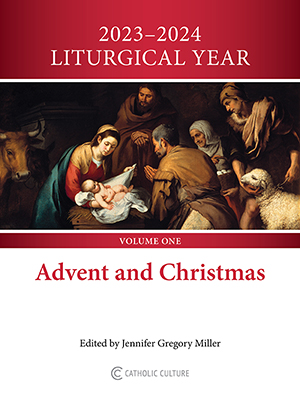God’s Community of Love—and Ours
By Dr. Jeff Mirus ( bio - articles - email ) | Mar 18, 2011
It is hard to prove the Trinity from the Old Testament, but there are obscure hints of it in various places which, in the light of Christ, become luminous themselves. For example, in Genesis 18, we are told that “the LORD appeared to” Abraham “by the oaks of Mamre, as he sat at the door of his tent in the heat of the day. He lifted up his eyes and looked, and behold, three men stood in front of him” (Gn 18:1-2).
Now let’s look back a little farther, to the account of Creation. God creates one thing after another through the “days” of creation, and then on the sixth and final day, He considers man:
Then God said, “Let us make man in our image, after our likeness; and let them have dominion over the fish of the sea, and over the birds of the air, and over the cattle, and over all the earth, and over every creeping thing that creeps upon the earth.” So God created man in his own image, in the image of God he created him; male and female he created them. (Gn 1:26-27)
How rich in meaning is this brief passage! Immediately we see that God intends to create something very special in man, something very like Himself. This “something” is personhood and, ultimately, a community of persons.
We now know that God is three persons, a community of love. Persons have the capacity to think and to will, and so to enter into genuine relationships with each other. This is something that mere animals cannot do; they are simply bound by their instincts and physical drives, without any transcendent sense of relationship at all.
This special character of the gift of “personhood” is also demonstrated by God’s decision to give man dominion over everything else, for clearly it takes a person to exercise dominion, to recognize the nature and ends of things, and to govern and develop them in ways which draw out their own innate qualities and perfections.
But the ultimate characteristic of a person is his ability to love. An intellectual capacity is necessary so that a person can stand outside himself, so to speak, in order to understand other things as they are (rather than simply grasping them instinctively like a beast in terms of their utility to himself). And the will is necessary so that, understanding things as they are, the person may choose to act in relationships to these things shaped in part by their proper ends. The unified summit of this activity is love, in which we are lifted out of ourselves to seek the good of another.
God has this “other” within Himself. Indeed, this must be so, for He is not just capable of loving, but He is love. And love is not perfect without its proper object. So the Father loves the perfect reflection of Himself in the Son and that love between the Father and the Son—again a perfect act—is a third Person, the Holy Spirit. Three Persons in one God: a community of Love.
But man too has this personal capacity to love, yet each human person is but a single person. Clearly it is in God’s mind from the first that man shall enter into a relationship of love with Him, but this love is above man’s nature, and must be actuated by a supernatural gift. The natural perfection of a man’s ability to love lies elsewhere:
Then the LORD God said, “It is not good that the man should be alone; I will make him a helper fit for him.” So out of the ground the LORD God formed every beast of the field…but for the man there was not found a helper fit for him. So the LORD God caused a deep sleep to fall upon the man, and while he slept took one of his ribs and closed up its place with flesh; and the rib which the LORD God had taken from the man he made into a woman and brought her to the man. (Gn 2:18-22)
That is why, Scripture tells us, “a man leaves his father and his mother and cleaves to his wife, and they become one flesh” (Gn 2:24).
So now, in the natural order, man too finds his completion and perfection in a community of love. He is thus more fully made in the image of God. In Christ, this unlocks even richer and deeper mysteries, for the marriage between a man and a woman becomes a sacrament and it is also a great sign of the relationship between Christ and the Church (Eph 5:32). God, in His very identity, is a community of love. Man too is designed to form communities of love in the family and in the Church, and through these communities to be elevated still higher, beyond the order of creation itself.
In Scripture there is often a great deal packed into a very few words. “Let us make man in our image,” God says. And from this we are born to love, true mysteries in clay, made for each other and for God.
All comments are moderated. To lighten our editing burden, only current donors are allowed to Sound Off. If you are a current donor, log in to see the comment form; otherwise please support our work, and Sound Off!









